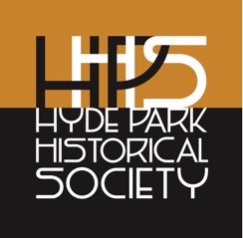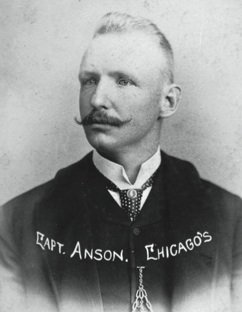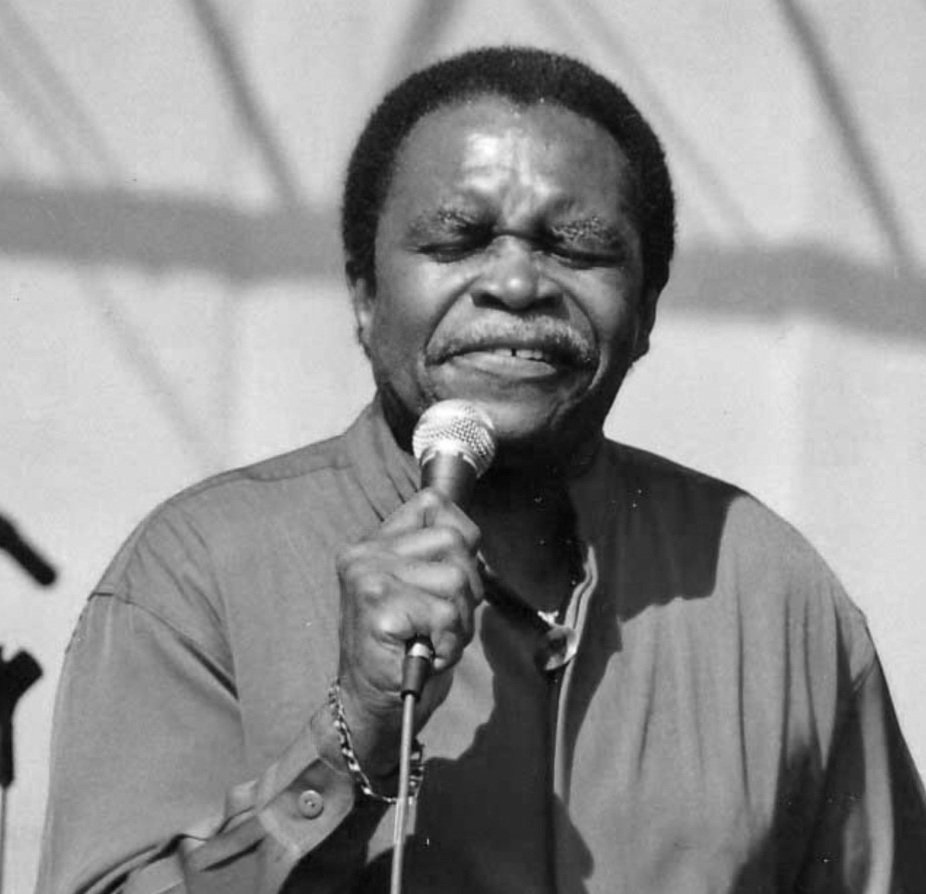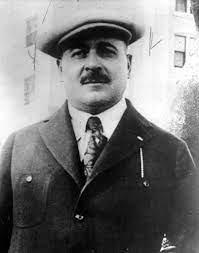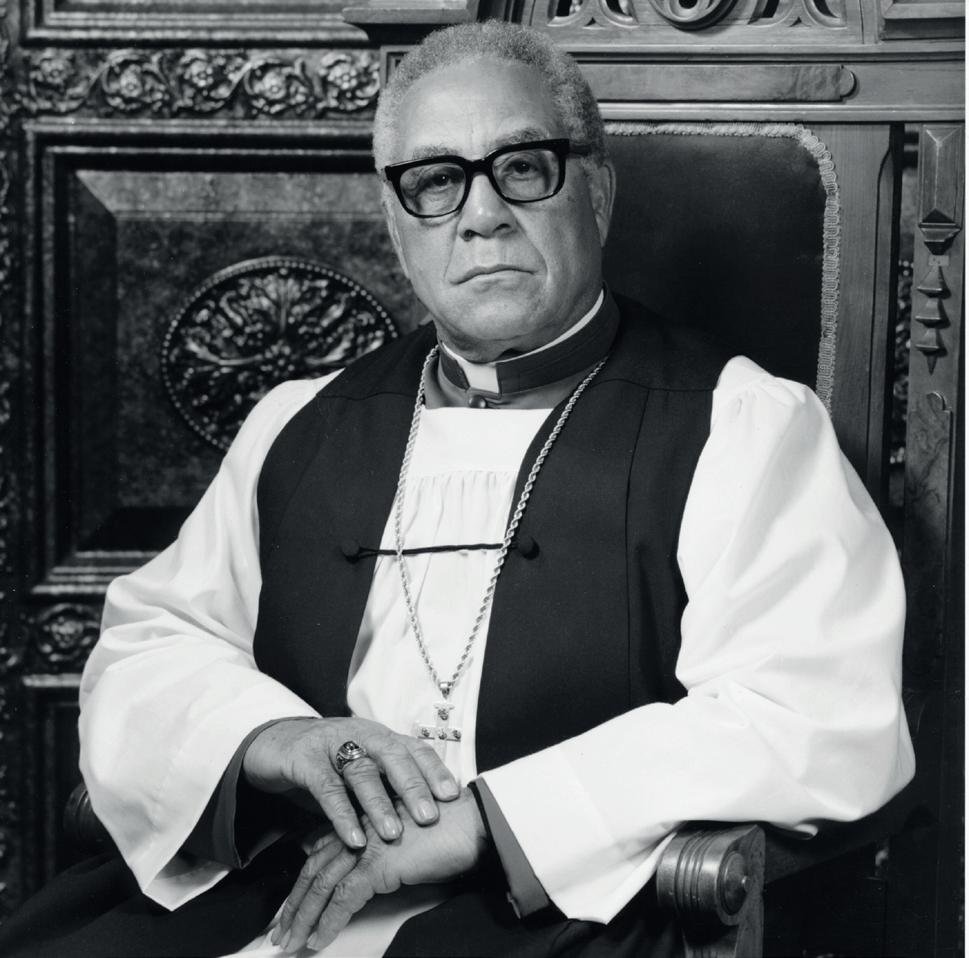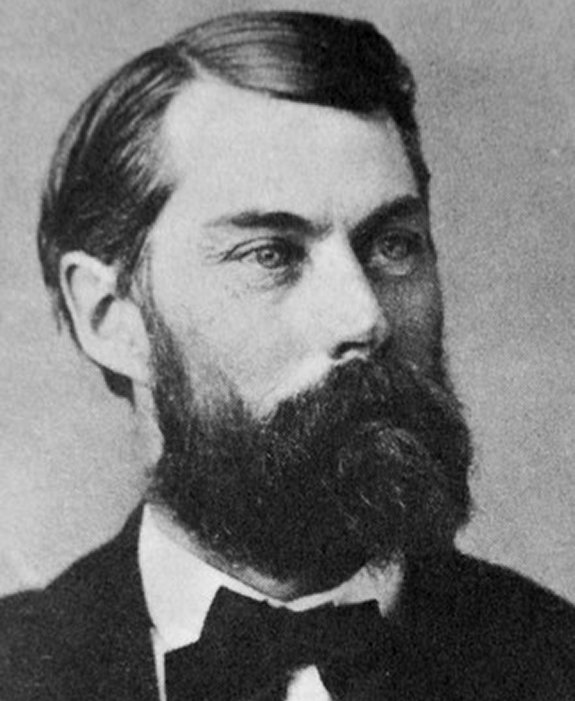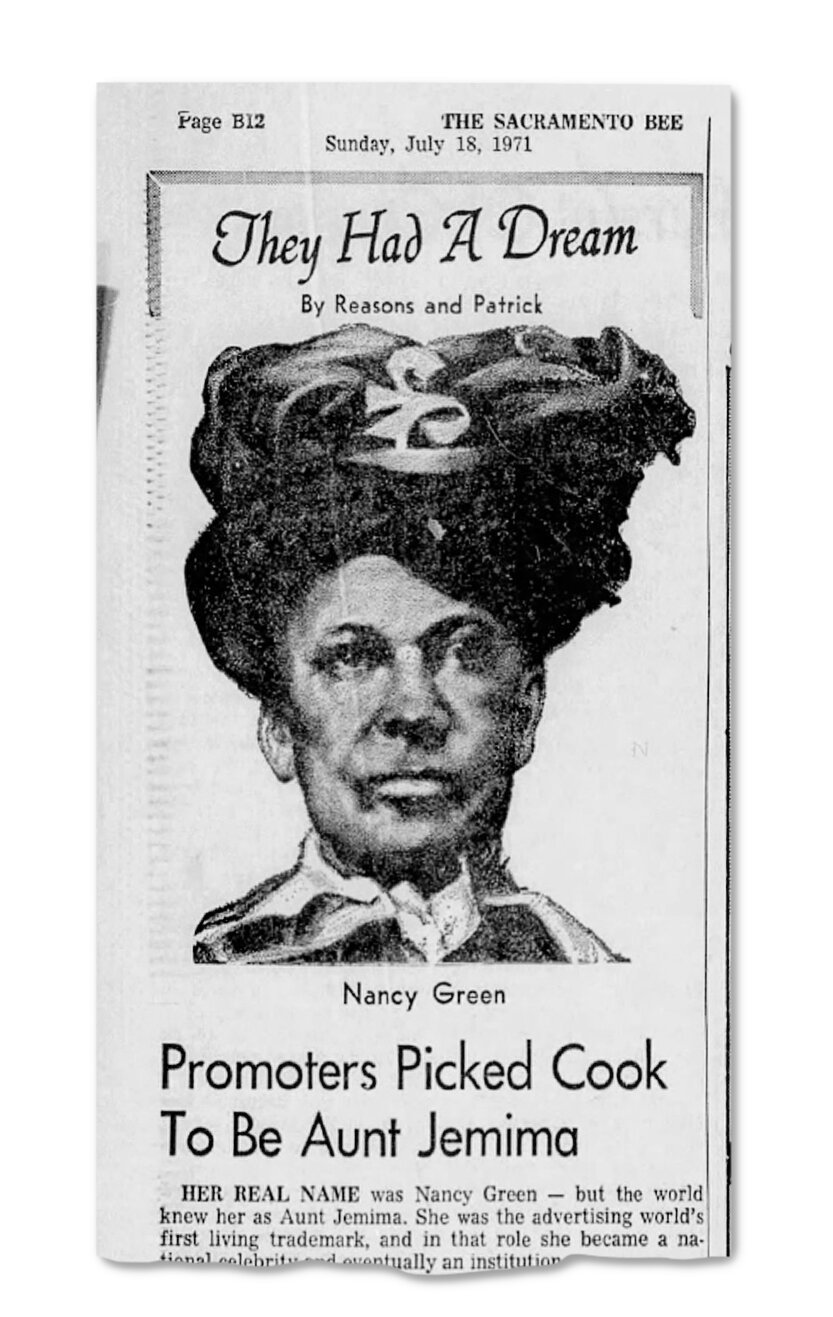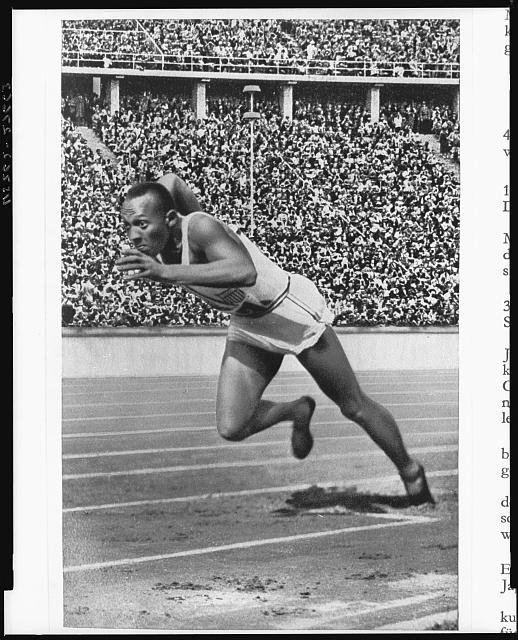Biographies
Name (A-Z by Last Name)
Captain Adrian Constantine Anson
Adrian Constantine “Cap” Anson is best remembered as a significant figure in the formative years of professional baseball. Born April 17, 1852 in Marshalltown, Iowa, Anson attended Notre Dame University for 1 year before making his major league debut at age 19 in 1871. After playing for professional teams in Rockford and Philadelphia, Anson spent 22 seasons with the Chicago White Stockings. After his retirement at age 45, Anson went on to manage Chicago for 19 additional seasons.While he was a transformative figure, and his skills on the ballfield were superior, he is also remembered for his strongly held racist beliefs. He stood in opposition of playing against other teams unless their entire team was caucasian, which has forever tarnished his reputation.
Ida B. Wells Barnett & Ferdinand L. Barnett
Ida Bell Wells Barnett is best known as an anti-lynching crusader, civil rights activist and suffragist. Born into slavery in Mississippi on July 16, 1862, Ida Bell Wells worked as a teacher starting from age 14 before attending Fisk University in Nashville. After refusing to cooperate with segregationist railroad policy, Wells sued the Chesapeake and Ohio Railroad in a case that went to the Supreme Court. Following the case and her resulting dismissal from her teaching job, Wells began her prolific career in journalism, writing fearlessly in opposition to racial injustice generally and lynching in particular. In 1895 Wells married Chicago lawyer and editor of The Chicago Conservator Ferdinand L. Barnett who is also buried in Oak Woods cemetery. That same year, Wells-Barnett published one of her most significant works, “A Red Record,” which exposed the horrors of lynching to a wider audience. Ida Bell Wells Barnett was an important figure in the founding of the Niagara movement and the NAACP.
Born in 1860, opera singer Jessie Bartlett Davis won much applause throughout the country by her singing of "Oh Promise Me," of which a portion of the song being is inscribed on her headstone. Davis was billed as "America's Representative Contralto.”
Jessie Bartlett Davis
Jesse
Binga
Jesse Binga is remembered as a significant figure in Chicago’s Black business community. Born April 10, 1865, in Detroit, MI, Binga moved to Chicago in 1893 with around $10, but found success as a realtor, entrepreneur and banker. Binga’s story became aspirational for Black Chicagoans in the segregated city. Binga’s financial success was undone in the 1930s due to depression-related economic hardships, investments gone wrong and embezzlement charges that resulted in his imprisonment.
Otis Lee Clay
Otis Lee Clay was an American R&B and soul singer who started in gospel music. He was born on February 11, 1942, in Waxhaw, Mississippi to a musical family who moved north in 1953 to Indiana. After singing with a local gospel group, he returned to Mississippi to sing with the Christian Travelers, before settling in Chicago in 1957. There he joined a series of gospel vocal groups including the Golden Jubilaires, the Famous Blue Jay Singers, the Holy Wonders, and the Pilgrim Harmonizers, before making his first solo secular recordings in 1962 which were unissued. Clay then joined the Gospel Songbirds, who recorded in Nashville in 1964. Clay became renowned nationally and internationally. He remained a popular live act in Europe and Japan, and recorded three live albums, Soul Man: Live in Japan, Otis Clay Live, and Respect Yourself, recorded live at the Lucerne Blues Festival in Switzerland. Ultimately, he recorded 18 albums during his career. In 2010, Clay was honored with a marker on the Mississippi Blues Trail in Waxhaw. As a resident of Chicago's West Side, he was actively involved in community-based economic and cultural initiatives, including the development of The Harold Washington Cultural Center in Bronzeville. In 2013, Clay was inducted to the Blues Hall of Fame.
Charles Chew
Charles Chew was an Illinois state senator who is best remembered for political achievements in the areas of Civil Rights, open housing and traffic safety. Growing up in Greenville, Mississippi, Che was a graduate of the Tuskegee Institute. Chew served as Chicago’s 17th Ward Alderman before he was elected to the Illinois state senate in 1966. Along with Carol Moseley Braun, Chew directed the Illinois legislature’s Black caucus. Chew was a fierce advocate on behalf of seatbelt laws. Besides his political career, Chew was a car enthusiast.
James Colosimo
James “Big Jim” Colosimo is best remembered as the boss of a Chicago crime organization in the early 20th century. Born in Consenza Italy in 1877, Big Jim emigrated to the United States in 1895 with his family as a teenager, settling in Chicago. Colosimo graduated from a life of petty crime to managing a nightclub and various brothels. Colosimo’s murder in 1920 is widely believed to be the work of individuals in Big Jim’s inner-circle who hoped to take control of his business empire.
Charles S. Deneen
Born May 4th, 1863, in Edwardsville, Illinois, Charles Deneen served as Governor of Illinois from 1905 to 1913 and later as Senator from Illinois from 1925 to 1931. During his tenure as Governor, Deneen helped push forward anti-lynching legislation in Illinois and oversaw the state through the Springfield Race Riots of 1908. Besides his political career, Deneen was an accomplished lawyer who acted as counsel in several high profile cases.
Colonel Franklin Denison
Colonel Franklin A. Denison was a Black American soldier who served in the Spanish American War and World War I. Born in San Antonio, Texas in 1862, Denison attended Lincoln University before moving to Chicago to attend Union College of Law, from which he graduated as valedictorian in 1890. Denison went on to become the first Black person appointed to the position of assistant prosecuting attorney in Chicago in 1891. As a soldier, Denison served in the Eighth Regiment of the Illinois National Guard in the Spanish-American War. Because of Denison’s fluency in Spanish, Denison served as a judge of the Court of Claims in Santiago, Cuba. After receiving the rank of Colonel following the Spanish-American War, Denison would serve in World War I, recruiting tirelessly. Despite his patriotic service, Denison continued to battle and overcome suspicion and racism within the US. Though listed as Colonel on his gravestone, was promoted to rank of brigadier general at his retirement in 1922. Besides his gravestone at Oak Woods, Franklin A. Denison is honored with a plaque near the “The Victory Monument” on King Drive near 35th street.
Edna Rose Denison Abbott & George S. Denison
Edna Rose Denison, Franklin’s widow, was born in 1893. Edna Rose went on to marry Chicago Defender publisher Robert S. Abbott. After Abbott’s death, Edna Rose was involved in a legal battle over ownership of the newspaper.
Born on May 1, 1914, George S. Denison, son of Edna Rose Denison and Franklin Denison served in World War II and rests in Oak Woods cemetery near his parents.
Thomas A. Dorsey
Born in 1899 in rural Georgia, Dorsey was a musician, composer, and Christian evangelical influencer in the development of early blues and gospel music. He wrote 3,000 songs, a third of them gospel, including "Take My Hand, Precious Lord" and "Peace in the Valley.” Dorsey moved to Chicago and became a composer and arranger of jazz and vaudeville music just as blues was becoming popular. Following a spiritual awakening, Dorsey focused on religious music. Dorsey served as the music director at Chicago's Pilgrim Baptist Church for 50 years, introducing and encouraging personal elements of participation such as clapping, stomping, and shouting when these were widely condemned as unrefined. In 1932, Dorsey co-founded the National Convention of Gospel Choirs and Choruses, an organization that remains active today. The first generation of gospel singers in the 20th century who worked or trained with Dorsey include Mahalia Jackson and James Cleveland. Author and Grammy Award winner Anthony Heilbut summarized Dorsey's influence by saying he "combined the good news of gospel with the bad news of blues". Called the "Father of Gospel Music" and often credited with creating it, Dorsey more accurately spawned a movement that popularized gospel blues throughout black churches in the United States, which in turn influenced American music and society at large.
Walter Eckersall
Walter Eckersall was a three-time All-America football player for the University of Chicago team from 1904-1906. Eckersall played under coach Amos Alonzo Stagg for whom the university football field is named. Growing up in Chicago, Eckersall excelled in high school athletics, leading the Hyde Park High School to a national championship in football and setting the Illinois state record in the 100 meter in track and field. Deemed the “Monsters of the Midway,” Eckersall and his fellow U of C Maroons dominated collegiate football during these formative years in the sport. Eckersall's gravestone at Oak Woods Cemetery reads that he was born in 1883, but it is believed that his actual birthdate was in 1886.
Eckstein & Rueckheim Family
Frederick and Louis Rueckheim are best remembered for creating the sweet popcorn snack Cracker Jack. Introduced at the Chicago World’s Fair in 1893, the German immigrant brothers trademarked the recipe in 1896. Preservation and distribution barriers were overcome by enlisting the help of experienced businessman Henry Eckstein who introduced the idea for wax-seal packaging, allowing Cracker Jack to reach a national audience while maintaining its texture. The brothers and Eckstein officially changed the name of the company to Rueckheim Brothers & Eckstein in 1903 as Cracker Jack continued to expand. The snack became synonymous with Major League Baseball because of its inclusion in the song “Take Me Out to the Ball Game” which is sung during the Seventh Inning Stretch of baseball games today and because of the distribution of Cracker Jack baseball cards.
Bernard Epton
Born on August 25, 1921, in Chicago, Illinois, Bernard Epton is best remembered as the Republican candidate opposing Harold Washington in the divisive 1983 mayoral election. Prior to his Mayoral bid, Bernard Epton served in the Illinois House of Representatives from 1969 to 1983. Epton was also a successful insurance attorney.
Enrico Fermi
Enrico Fermi was an Italian-born physicist who is widely remembered as a key architect of the nuclear age. Fermi’s work in quantum mechanics was already distinguished before leaving Europe on the eve of the Second World War for the United States, receiving the Nobel Prize for physics in 1938. After first settling in New York City, Fermi soon made the University of Chicago his base for research. It was here that Fermi would create the first nuclear chain reaction at the University football field on December 2, 1942. Fermi joined Robert Oppenheimer in Los Alamos in the project to produce the first atomic bomb. Following the war, Fermi returned to the University of Chicago as a full-time professor and focused his research increasingly on particle physics. Fermi died in Chicago on November 28, 1954 at age 53 and is buried at Oak Woods cemetery.
Bishop Louis Henry Ford
Famous among Chicagoland commuters as the namesake of the stretch of Interstate 94 from I-57 to 170th street, Bishop Louis Henry Ford was a well known leader of the Church of God in Christ. Before moving to Chicago in 1933, where he would become the presiding bishop of an 8.5 million member congregation, Ford began his ministry in Lexington, Mississippi. In 1955, Ford gave the eulogy at the funeral of Emmett Till at Robert’s Temple Church of God in Christ. Besides his accomplishments as a bishop and community leader, Ford was passionate about history and preservation, purchasing Chicago’s oldest house, the 1836 Henry B. Clarke House, and maintaining it for years before it became a city-run museum in 1982.
Henry Blake Fuller
Henry Blake Fuller was a novelist who was born into a wealthy Chicago family in 1857. Fuller published two novels set in Europe before publishing The Cliff Dwellers in 1893, which was set in Chicago. Along with his more local focus, Fuller made a stylistic shift toward realism with The Cliff Dwellers, which would help define his succeeding works, such as With the Procession, Under the Skylights and On the Stairs. Fuller’s 1919 novel Bertram Cope's Year is notable because it centers homosexual characters, one of the first American novels to do so. Besides novels, Fuller published short stories as well book reviews and editorials for Chicago newspapers.
Nancy Green
Nancy Green is best known as a model who first portrayed the character “Aunt Jemima” on behalf of the R.T. Davis Milling Company. Green was born into slavery in Montgomery County, Kentucky in 1834. Green moved to Chicago as a personal attendant and nurse to a prominent family. Making her debut as Aunt Jemima at the World's Columbian Exposition held in Chicago, Green interacted with crowds as she cooked pancakes while playing the role of a plantation slave. Green would continue on as the brand’s living trademark for nearly 20 years following the Columbian Exposition. Besides her work playing Aunt Jemima, Green was an organizer for Olivet Baptist Church in Chicago and dedicated time and effort to anti-poverty programs.
Sam Golden
A devoted cellist and chamber musician, Sam Golden was born in 1927. In 1969 along with his wife Paula Golden and the late Zita Cogan of the University of Chicago Music Department, and resort owner Richard Gray, he founded the Golden Chamber Music at Sleepy Hollow in South Haven, Michigan, a wonderful outlet for adult musicians to come together in musical fellowship. Golden and his wife Paula, also a cellist, were a team at Golden Chamber Music. An attorney by training, Golden had a long career at the University of Chicago as part of the inhouse legal department. He was a graduate of the Hutchins College and the University of Chicago Law School. Golden began his career in Leon Depres' law office practicing labor law. In 1953, he became labor attorney at Argonne National Laboratory, shortly after he became chief counsel there.
William Rainey Harper
William Rainey Harper was born July 24, 1856, and grew up in New Concord, Ohio. A highly-gifted young student, Harper entered college at age 10 and received a PhD by age 18. Focusing his academic pursuits on Indo-Iranian and Semitic language, Harper mastered several tongues, but Hebrew was his primary focus. Harper’s passion for language studies informed his work as an educator and he encouraged and inspired his students. With the financial backing of John D. Rockefeller, the University of Chicago was founded in 1891 with Harper as its president. Harper played a significant role in shaping the university in these early formative years, leaving a lasting impact on the institution. He was initially buried at Oak Woods Cemetery and the marker remains. However, his body was later moved to Rockefellar Chapel on the UChicago Campus.
Monroe Heath
Monroe Heath was a two-term mayor of Chicago from 1876 to 1879. Born in Grafton, New Hampshire on March 27, 1828, Heath followed the 1849 Gold Rush to California. Prior to serving as mayor of Chicago, Heath founded a paint-making business, and, like many Chicagoans, Heath’s business was burned in the Great Chicago Fire. Heath served as alderman of the 12th Ward for five years prior to his election as Mayor.
John H. Johnson
John H. Johnson was born January 19, 1918 Founder of Ebony and Jet Magazines, Johnson was an integral figure in the civil rights movement by providing a platform for black news to be shared during the civil rights movement. For example, Jet magazine photographers were the first to photograph Emmett Till's body at his funeral casket, and published it at the request of his mother to show the reality of the grousome hate crime. Johnson was a respected entrepreneur in the black community in Chicago and the entire United States. Johnson is said to have been the first black person to own property on Michigan Ave, and gained attention in the 80s by appearing in Forbes Magazine.
Kenesaw Mountain Landis
Born in Millville, Ohio in 1866, Kenesaw Mountain Landis is best remembered as the commissioner of baseball in the wake of the 1919 Chicago Black Sox scandal in which players were accused of fixing the World Series. Landis was born to a Union army surgeon who lost his leg at the battle of Kenesaw Mountain in Georgia, which inspired his son’s name. Landis’s previous experience as a Federal Judge gave executives in the league faith that the integrity of the game could restored under his firm management. Indeed, Landis’s tenure as commissioner is synonymous with harsh punishments for any signs of corruption.
Charles H. Markham
Born to humble beginnings on May 22, 1861 in Clarksville, Tennessee, Charles H. Markham began his railroad career in Santa Fe, New Mexico, professionally ascending from working with passengers and freight to be President of the Illinois Central Railroad from 1911-1918 and from 1919-1926. Markham’s tenure as President of the company is remembered as an era of economic prosperity and efficiency within the railroad industry.
Ada Sophia McKinley
Ada Sophia Dennison McKinley was an educator and founder of the South Side Settlement House, an institution that continues to serve Chicago’s South side under its new name: Ada S. McKinley Community Services. Born June 26, 1868, McKinley grew up in Corpus Christi, TX. McKinley attended Prairie View College and Tillotson Missionary College before becoming a teacher in the Texas public school system. After marrying William McKinley, a dentist, the couple moved to Chicago where Ada McKinley would become an increasingly involved in the social and political work. Following World War I, McKinley dedicated a her time to helping returning Black soldiers. The foundation of the South Side Settlement House grew out of this ongoing work. Beyond soldiers, McKinley also sought to support Black individuals arriving in Chicago from the South.
Ermine Smith Morris
Ermine Smith Morris attended Bransford High School before studying commerce at Tennessee State University Nashville. As a pianist for the St. John M.E. church, Ermine Smith Morris became known as an excellent musician within the community. Ermine Smith Morris took a position teaching at Bransford High School before marrying Wilberforce University professor Samuel S. Morris, Jr in the Smith family living room in 1943. When the couple moved to Chicago, both took on leadership roles in the church, with Samuel becoming the presiding prelate of the Fourth Episcopal District, and Ermine taking on the role of episcopal supervisor of the Women’s Missionary Society of the Fourth Episcopal District, AME church.
Jesse Owens
James Cleveland “Jesse” Owens was born September 12, 1913 in Oakville, Alabama to sharecropper parents, the youngest of ten children. The Owens family would move northward as part of the Great Migration, relocating to Cleveland, Ohio. Jesse attended The Ohio State University and excelled in track and field, earning him the nickname “The Buckeye Bullet.” Jesse Owens’s dominant performance at the 1936 Berlin Olympics Nazi Germany resulted in his winning four gold medals. Owens’s performance discredited the Nazi Party and Adolph Hitler’s claims of white superiority on the world stage. Owens remained an ambassador for sports through the remainder of his life and after relocating to Chicago he served as a board member and director of the Chicago Boys' Club.
Conrad Seipp
Conrad Seipp was born in Hessen Germany on September 27, 1825. Seipp moved to the United States in the 1840s and began brewing beer in Chicago in 1854. His innovative methods of brewing and storage and the survival of his brewery through the Chicago fire made Seipp’s brewing company one of the most popular brands of its time.
Robin W. Skyles
Reverend Robin W. Skyles III was a trailblazing Black American clergyman, founding the St. James Lutheran Church, Illinois’ first Black Lutheran Congregation in the State of Illinois.
Oceola Staples
Born September 10, 1917, in Louisville, Mississippi, Oceola Staples married Roebuck Staples in 1933 and the couple moved to Chicago two years later. By the mid-1950s the couple’s children were performing as the Staple Singers with Roebuck playing guitar. Affectionately known as "Mom Staples," while Oceola never performed with the group, her support and encouragement is frequently cited as essential to the group’s success.
Pops (Roebuck) Staples
Pops (Roebuck) Staples was a renowned America gospel and R&B musician. A leading figure in gospel in the1960s and 1970s, Pops was an accomplished songwriter, guitarist, and singer. He was the patriarch, founder (along with his wife Oceola) and member of the legendary singing group The Staple Singers, which included his son Pervis and daughters Mavis, Yvonne, and Cleotha. Born December 28, 1914, Pops (Roebuck) Staples grew up on a cotton plantation near Drew, Mississippi, the town where Emmett Till was lynched in 1955. From his earliest years Pops heard, and began to play with, local blues guitarists such as Charlie Patton (who lived on the nearby Dockery Plantation) and Robert Johnson. In 1933, he married Oceola Staples (also buried in Oak Woods) whom he met in Drew, and in 1935, they migrated north to escape the racism in Mississippi and settled on the south side of Chicago. Pops and Martin Luther King, Jr. were great fans of each other and close friends. Over the course of his career, Pops Staples was nominated for three Grammy Awards, winning the 1995 Best Contemporary Blues Album Grammy for Father, Father
Steven Strauss
Stephen Strauss was a beloved father and grandfather who loved reading, comedy, and watching birds. A financial adviser in the Loop for nearly six decades, Strauss still commuted daily to his downtown office by Metra from Highland Park at 88 years old. Strauss’s life was cut short by a shooter at the July 4th parade in Highland Park in 2022. Despite the tragedy surrounding his death, his family celebrated the humor and curiosity that Strauss was known for in life at his memorial.
Andrew L. Thomas
Andrew L. Thomas was a physician and activist who began his medical career studying tropical diseases in Ghana, but dedicated much of his time to creating a path for future generations of Black physicians. After graduating from Parker High School in Birmingham, Alabama, Parker received his A.B. from the University of Chicago. Thomas went on to attend Howard University Medical School where he received a scholarship to do research in Ghana. This experience inspired Thomas to found “Project 76,” a program meant to provide scholarships for medical students. Thomas served as the physician to Reverend Jesse Jackson who would eulogize him at his funeral in 1985.
William Hale Thompson
William Hale Thompson, also known as “Big Bill” because of his stature, was a two-term mayor of Chicago (1915-1923) and (1927-1931). Thompson’s legacy is complex and his era of tumultuous governance of the city was shaped by his enemies and alliances. During the chaos of the 1919 Race Riot, the inability of officials to cooperate at a state and local level is often attributed to Thompson’s feud with Illinois Governor Frank Lowden. This ineffective governance likely contributed to the continued violence of the riots, which disproportionately affected the Black community. Thompson’s association with organized crime in the 1920s has contributed to his legacy as a corrupt mayor. However, Thompson was highly popular during much of his tenure, enjoying broad support in the Black community in particular. Thompson died at the age of 74 on March 19, 1944 and was buried in Oak Woods cemetery in a bronze casket. As of 2022, “Big Bill” is Chicago’s most recent Republican mayor.
Lyman Trumbull
Lyman Trumbull was a US Senator from Illinois who is best remembered as a co-author of the 13th Amendment to the US Constitution which ended slavery in the United States. Born on October 12, 1813 in Connecticut, Trumbull moved to Illinois in 1837 and was elected to the Illinois House of Representatives 3 years later. Trumbull served as the Illinois Secretary of State and as a justice of the Illinois Supreme Court before being elected to the Senate in 1855. Beyond his role in co-authoring the 13th Amendment, Trumbull championed the creation of Yellowstone National Park. After his political career, Trumbull practiced law in Chicago, notably defending railstrikers in a Supreme Court case in the 1890s.
Harold Washington
Harold Washington was born on April 15, 1922 in Chicago Illinois and went on to serve as Chicago’s first Black mayor from 1983-1987. Growing up in Chicago’s Bronzeville neighborhood, Washington ran track at DuSable High School before finding work in Chicago’s meatpacking industry. Washington served in the Air Force during World War II, rising to the rank of First Sergeant. After the war, Washington returned home to Chicago and attended Roosevelt University where he obtained a B.A.. Washington continued his studies at Northwestern University School of Law where he received his JD in 1952. Upon completion of his law degree, Washington began his political career in the 3rd Ward Alderman office before being elected to the Illinois House of Representatives in 1965. Washington would serve in the Illinois Senate as well as the US House of Representatives. Washington’s mayoral campaign mobilized many first time voters resulting in his election first in 1983, and then a second term in 1987. Washington lived at Hampton House in Hyde Park during his tenure as mayor.
Born in 1929 in Chicago, Albertina Walker was American gospel singer, songwriter, actress, and humanitarian. She began singing in a youth church choir at an early age and joined several gospel groups. Albertina was greatly influenced by the influential gospel singer Mahalia Jackson whom Jackson took on the road when Albertina was just a teenager. In the early 1950s, Walker founded her own gospel music group The Caravans. Walker co-founded the Gospel Music Workshop of America. She also lent her support to many charitable organizations such as United Negro College Fund, National Council of Negro Women, and the NAACP. In 1988, Walker founded The Albertina Walker Scholarship Foundation for the Creative and Performing Arts. Albertina was conferred an honorary degree by the Chicago Theological Seminary, an affiliate of the University of Chicago.
Albertina Walker
Edward H. Wright
Born in New York City on September 28, 1863, Edward H. Wright attended public school before studying at College of the City of New York. Wright arrived in Chicago in 1884, first working as a Pullman porter, then in the post office. After taking a position in the county clerk's office, Wright became involved in Republican politics and gained increasing influence within the party. Edward H. Wright was admitted to the bar in 1896. Being awarded a position in the Secretary of State's office in Springfield, Wright became the first Black person to hold a clerical position in the Illinois state government. With substantial influence in city and state politics, Wright championed the campaigns of other Black politicians, including Ferdinand Barnett who, with Wright’s help, became the first African American assistant state's attorney for Cook County. Edward H. Wright was elected as the Alderman to the 2nd Ward in 1920.
Ting-Wa Wong
Ting-Wa Wong was a professor at the University of Chicago Medicine for nearly six decades. Born in Hong Kong Oct. 15, 1932, Wong moved to the United States to attend college, where she graduated from the University of California at Berkeley in 1953. Wong attended medical school at the University of Chicago, graduating in 1957. After completing multiple hospital internships in the years following graduation, Wong returned to teach at the University of Chicago in 1961, where she would stay for the remainder of her career. The recipient of many awards for excellence in teaching are testament to Ting-Wa Wong’s legacy as a dedicated educator.
Other Notable individuals we hope to feature in the future include:
All individuals with an * have been cataloged on the digital map despite the lack of biography
S. Grace Nicholes*
John Marshall Hamilton*
Arthur Brazier*
Johnathan Young Scammon*
Marcus Farwell*
James H. Woodworth*
Gary Becker*
Elmer Washburn*
Corinne True
Victims of the Eastland Disaster
Maud Slye
Homer Hibbard
Fred Rice Jr.
Eugene Sawyer

